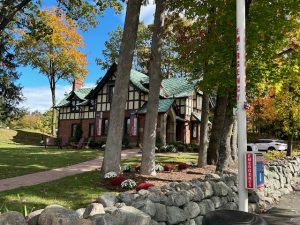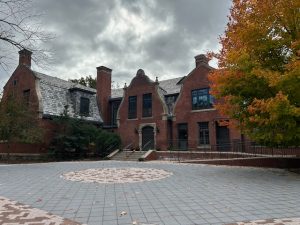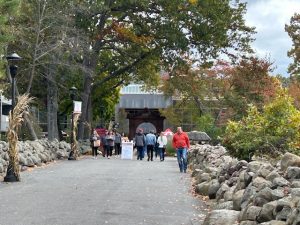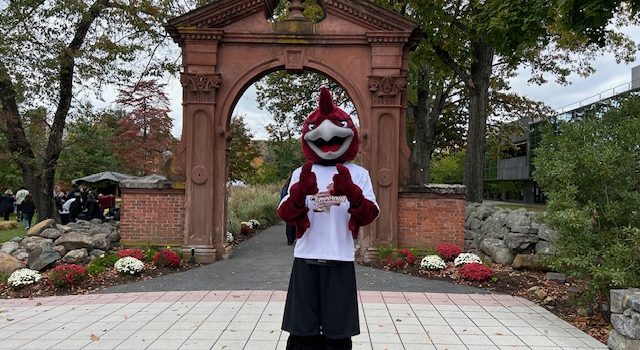Getting To Know: Ramapo College of New Jersey (RCNJ)-Again
Before I left for my Chicago college tour I attended a high school FIRST Robotics event where I spoke with an admissions representative from Ramapo College of New Jersey (RCNJ). I had done business with this school in my past life, and visited ten years ago when my nephew was looking at colleges. After speaking with the admissions rep about the science programs, I felt that it was time to take another visit. It made me think a lot about how colleges work at managing community. Prior to visiting campus for a Sunday open house, I watched an episode of The College Tour, where students called the campus ‘Home Sweet ‘Po‘. I also found more photos to update a Ramapo Pinterest page.
RCNJ attracts primarily a B/B+ student, most likely from a New Jersey high school, who would prefer a small or mid-sized college.
This school has reasonable direct charges when compared against private colleges with about the same number of undergrads, and that’s before merit scholarships.
The middle 50 percent of the freshmen who arrived this past fall had SAT scores than ranged from 1120 to 1270, with an average of 1210. The average GPA was a 3.5. While RCNJ was test optional before the pandemic, test scores are considered Important, if they are submitted. They are required for admission to health-related Articulation Programs (Biology/Dental-LECOM, Biology/Optometry-SUNY Optometry, Biology/Osteopathy-LECOM, Biology/Pharmacy-LECOM, Biology/Pharmacy-Touro College).
RCNJ has strong appeal within Northern New Jersey. Over 40 percent of the undergraduates come from Bergen County, where the college is located as well as neighboring Morris and Passaic Counties. As a result, only 40 percent of the undergraduate student body lives on campus, even though the college can guarantee housing for four years.
If someone told me that RCNJ was the most attractive New Jersey public college I would not argue.
Set in a picturesque valley on the hilltop grounds of a former estate, the attractiveness of this campus extends to the residence halls and the arts facilities. The Overlook, in particular, is one of the nicest halls that you will find on any college campus..RCNJ is one public college where that campus looks and feels more expensive than it really is. RCNJ has also taken great care when it came to landscaping and preserving the older buildings. Parking is pushed out to the edges of campus. While the campus has nice hiking trails, it is also close to the Ramapo Valley County Reservation which offers even more outdoor recreational activities. Those who are interested in environmental science might feel that they are living in the most modern field station imaginable.



There’s a lot to like about academics at RCNJ.
The business, education and STEM/Health Professions programs are among the best values that you New Jersey residents will find for their money. While RCNJ asks students to choose one of the undergraduate schools when they apply, it’s relatively easy to switch programs or turn most potential majors into minors. RCNJ is similar to a liberal arts college in that students in most majors take four classes per semester instead of five. Classes are small for a public college; virtually none will have over 35 students.
RCNJ does a good job with career advising.
The Cahill Center, named for a former governor of New Jersey, runs Career Pathways programs where new students are encouraged and guided towards career options beginning in the freshman year working with an assigned academic advisor as well as a career advisor. Ramapo also offers students the opportunity to choose between internships or cooperative education, aka ‘co-op,’ to gain work experience, paid or unpaid, while pursuing their degrees. Co-op students may earn two credits working 120 hours during a semester or four credits by working 240. They may earn up to eight degree credits through co-op. Internships do not need to be for credit, unless required within a major.
RCNJ also capitalizes on its location 25 miles from New York City.
The campus has its own bus stop within a reasonable walking distance, If students plan their class schedule right, they can intern more than one day a week in the city or spend the day there when they are off from classes. The student center has a discount ticket booth for entertainment and reduced-price mass transit fares
One surprise to me, undergraduate enrollment has gone down since I previously visited RCNJ.
During Fall, 2017, Ramapo had over 5,500 matriculated undergrads. By Fall, 2022 there were just over 4,700. One interesting tidbit from watching a student-produced YouTube: rooms in one suite-style hall that were perviously triples had become large doubles, though the clothing storage for three was still in the room! Freshman retention also declined. It went from 88 percent in 2017 to 84 percent. in 2022. The four-year graduation rate reached a high of 61 percent for the Class of 2018. It was 57 percent for the Class of 2022. Around 70 percent of each class that entered since 2012 graduated in five years. My hunch is that students took more time because they did co-ops or worked longer hours. Commuting costs have risen faster than housing costs since the pandemic.
What are some reasons why enrollment dropped?
I have visited other regional public colleges that lost enrollment because jobs and population left a region. That is not true for Bergen County, one of the more affluent counties in America. Another reason is articulation agreements with community colleges. It is less expensive to begin the first two years at a community college that offers many transfer pathways, as Bergen Community College offers with RCNJ, even for Nursing. I also wondered if the downsides are well known locally, given the student and alumni reviews that I read,
What are some downsides?
- A car is a must if you live on campus. The campus is not within any walking distance of off-campus dining, entertainment or shopping. However, a car is a huge cost item.
- Off-campus apartments within a short drive are scarce and will easily cost over $1,000/month plus the costs of a car.
- With only 1,600 students living in the residence halls (not apartments) you have to find your friends quickly through clubs, organizations or an athletic team. RCNJ appears to be a lonely place if you cannot.
- Bergen County observes Sunday “blue laws,” So many retail shopping options are closed on Sundays.
- Unlike other colleges, large fraternity parties and private house parties are not a major part of campus social life. This is more likely to happen at schools that have a “Greek Row” or permit fraternities and sororities to have their own houses. But a college that has more of a party atmosphere with Greek houses is also likely to have more of a police presence on and near campus.
- NJ TRANSIT train services from Mahwah require a transfer at Secaucus to go to New York or Hoboken. That commute is a little over an hour. It will work ok for fun on Thursday or Friday night, but will be less convenient on the weekends.
This may sound silly, but RCNJ lacks a food court outside of the dining hall-and that’s a downside.
Most college student centers have a food court with “brand name” food providers where students either socialize or get their food quickly and leave. But RCNJ placed the Starbucks in the library and put the Dunkin’ Donuts in the nursing building. Neither location has many seats. Both are closed on weekends, which adds to the “There’s nothing to do on weekends” comments that I saw online. At the time time, the college put one of the main dining halls in the student center. I understand: RCNJ must earn as much as it can for its dining services with only 1,600 students required to buy a meal plan. But students are more drawn to the food brands they know,. This is also true of commuters who do not usually pay for a meal plan or visit the dining hall.
Conclusions
RCNJ is a really good school for someone who wants the lower costs of a public college combined with the smaller classes of a private liberal arts school. However, the commuter vibe keeps RCNJ from being a more residential community.
Report Card: Ramapo College of New Jersey (RCNJ)
- Four-Year/Six-Year Graduation Rates: B/B
- Freshman Retention: B
- Costs: B–students really need a car
- Curriculum: A
- Community: B
- Comforts: A
- Connections: A (New York area)/C (elsewhere)
Want to know more about me?
Buy my new book, The Good College!
Listen to my latest interview on ‘Tests and the Rest’ with Amy Seeley and Mike Bergin!
Hear my talk, What Exactly Is a Good College? hosted by test-prep experts Amy Seeley and Mike Bergin on Tests And The Rest!
Check out my talk, College Is A Learning AND Living Community hosted by Dr. Cynthia Colon from Destination YOUniversity on Voice of America Radio!
Sharing is caring!

